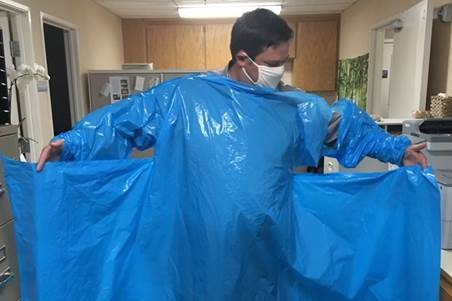Nursing Homes Say Some Protective Gear Sent by FEMA Is Unusable
Complaints include gowns unsuited to health-care settings, gloves too small for adults; government and contractor say all are up to standard
John Hovey, health care administrator at Warm Beach Senior Community in Stanwood, Wash., models a gown from a FEMA shipment.
PHOTO: JOHN HOVEY
By Anna Mathews
June 11, 2020 5:30 am ET
A major federal effort to ship protective gear to nursing homes during the coronavirus pandemic is providing equipment that some facilities say is unusable, including plastic gowns that they say don’t meet their infection-control requirements.
The shipments, coordinated by the Federal Emergency Management Agency, are ultimately supposed to provide two weeks’ worth of gloves, gowns, surgical masks and eye protection for each of approximately 15,000 facilities. A FEMA spokeswoman said that as of Tuesday, 13,654 packages have been sent, with more slated for the coming weeks.
A Genesis Healthcare facility in West Virginia received gowns in a Federal Emergency Management Agency shipment that lacked armholes.
Nursing homes have said the federal equipment was needed sooner, when many faced a dangerous shortage as the coronavirus swept through. A recent Wall Street Journal tally of state data showed more than 44,000 coronavirus-related deaths of residents and staff in long-term-care facilities, including assisted-living sites. Nursing-home staffers have said in lawsuits and complaints to the federal Occupational Safety and Health Administration that they were often working with inadequate protection.
The Evangelical Lutheran Good Samaritan Society, which operates 147 nursing homes, said roughly half of its facilities have received federal shipments. But the nonprofit, which is part of Sanford Health, said it wasn’t planning to use the gowns, masks or most of the gloves.
“If we were out of everything else, we would go to this stuff,” said Randy Bury, chief executive of the nonprofit. But, he said, some of the materials sent by FEMA posed a risk of failing a regulatory inspection: “If we had some of this stuff in use, and had an infection-control survey, I would be afraid they would cite us for insufficient PPE.” Most of the masks were too small for adults, and the ear loops were too loose, while many gloves were also too small to fit staffers, he said.
Katie Smith Sloan, president of LeadingAge, an association that represents nonprofit providers of aging services, said, “LeadingAge calls on the administration and Congress for immediate access to ample amounts of each category of PPE for all care providers who serve older Americans.”
The FEMA spokeswoman said the federal initiative “supplements existing efforts to ensure nursing homes across the country have PPE during the Covid-19 pandemic.”
Several nursing-home executives said their facilities had received gowns in FEMA shipments that weren’t acceptable in a patient-care setting. “It’s the kind of thing I would use in my garden for tarps,” said Jon Riewer, chief executive of Eventide Senior Living Communities, a nonprofit based in Moorhead, Minn., that owns six nursing homes.
FEMA Administrator Peter Gaynor. The agency is supposed to provide two weeks’ worth of gloves, gowns, surgical masks and eye protection for each of approximately 15,000 nursing homes.
 PHOTO: TOM WILLIAMS/ZUMA PRESS
PHOTO: TOM WILLIAMS/ZUMA PRESS
Noah Marco, chief medical officer of the Los Angeles Jewish Home, a nonprofit that owns four nursing homes, said the blue plastic gowns were likely to increase the risk of infection for the wearer, calling them “embarrassingly unusable.”
The blue gowns were large and not fitted, requiring tape to secure them, nursing-home executives said. To remove them would require ripping, likely exposing the wearer to the virus if the gown had been contaminated, said John Hovey, health-care administrator at Warm Beach Senior Community in Stanwood, Wash., who said the gowns looked like “glorified garbage bags.” He said many of the gloves his facility received from FEMA were also too small for adults.
Genesis Healthcare Inc., the biggest U.S. operator of nursing homes, said two of its facilities had received gowns from FEMA that lacked hand holes. “We are not aware of other issues other than the reality that a one-week supply is obviously not enough given the complexity of the virus which continues to impact nursing homes,” Richard Feifer, the company’s chief medical officer, said in a statement.
Last week, 136 Senate and House Democrats sent a letter to the Department of Health and Human Services saying nursing homes are in “dire need of additional federal support and guidance,” including personal protective equipment. Trump administration officials have said that they have focused closely on nursing homes, offering significant support and guidance.
Nursing homes continue to report shortages of gear. A Journal analysis of data released last week by the Centers for Medicare and Medicaid Services found that 673 nursing homes said they lacked a current supply of at least one category of personal protective equipment, while 3,138 had less than a one-week supply of at least one type for the week of May 31. The Journal analysis included about 12,000 facilities with data for that week that passed a CMS quality check. The federal survey that produced the CMS data asked about masks, gloves, eye protection, hand sanitizer and gowns.
The FEMA spokeswoman said the gear it is supplying meets requirements of the federal Food and Drug Administration or the Association for the Advancement of Medical Instrumentation, a nonprofit. But “due to concerns from those who received them, the contractor is working on a short instructional video” about proper use of the gowns, she said.
The contractor, Federal Resources Supply Co., said it was procuring and distributing the equipment under a contract with the Defense Logistics Agency. The company said it shipped a mix of glove sizes and used only approved sources. The blue plastic gowns exceed the standard required by the contract, the company said. Federal Resources said several nursing homes had thanked it for the equipment, and its customer-service department worked with any facilities that raised concerns.
A spokesman for the Defense Logistics Agency said the contract was worth $143 million, and that its personnel have visited the Federal Resources facility “to ensure adequate materiel and staff was on hand for the requirement.”
Nursing-home operators said they had sometimes been confused as shipments of protective gear showed up, apparently from the government, with the exact source not always clear. Several said they had gotten boxes of cotton masks which they assumed were from FEMA, though they said such masks wouldn’t protect staffers.
A spokeswoman for the Department of Health and Human Services said that it was sending cloth masks to nursing homes and other sites, but they weren’t intended for health-care workers. The masks are “part of a multiprong approach to reopen American economic activity while continuing to limit spread of Covid-19.”
Questions?
Contact:
Laura Hofmann, MSN, RN – Director of Clinical and Nursing Facility Regulatory Services
c: 425-231-4804


